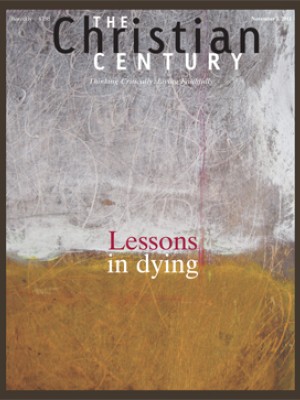The ‘Occupy’ movement includes religious groups
As waves of demonstrators descended on New York City to unite with others to protest corporate greed, they were met by typical sounds of raucous youth-led protests: drum beats, police sirens and shouted political slogans. They didn't expect to hear hymns.
Yet protesters rounding the corner of Zuccotti Park encountered dozens of white-robed worshipers singing spirituals and blessing the demonstrators while holding signs reading "Blessed are the poor" and brandishing handmade Christian crosses.
The group, calling themselves the Protest Chaplains, had traveled from Boston to join the Occupy Wall Street movement, which claims to advocate for "the 99 percent" of Americans against the "1 percent" who control much of the country's wealth.
The Protest Chaplains, a loose group of mostly Christian students, seminarians and laypeople organized through Facebook, expressed support in early October for the movement the best they knew how: through their faith.
"In a group that had a lot of bandanas and black hoodies, we stood out," said Marisa Egerstrom, an organizer of the group and doctoral student at Harvard University's Graduate School of Arts and Sciences. "But people kept coming up to us and saying, 'You know, you are the first Christians I've seen at a protest . . . on our side.'"
Read our latest issue or browse back issues.
As police helicopters hovered overhead, seminarian Rix Thorsell, wearing a clerical collar, marched on October 5 with other members of Brooklyn's Greenpoint Reformed Church in a protest that has captured national attention. "Jesus stood with the 99 percent [of society that is not wealthy]," said Thorsell, a student at New York's Union Theological Seminary. "He didn't support the establishment. He ate and lived among the poor."
Also joining the protests were members of Brooklyn Congregations United, a grassroots interfaith group assisting those facing bank foreclosures on their homes. Tom Martinez, a United Church of Christ minister, said faith communities are involved in the protests for varied reasons, including worries "about the growing and unchecked power of corporations."
Religious protesters, once a staple of American progressivism, have become a rare sight at liberal demonstrations in recent years. But as the Occupy Wall Street movement rapidly expands to Boston, Chicago, Washington, Los Angeles and other cities, progressive religious groups are playing an increasingly visible role.
Chicago-based Interfaith Worker Justice, a labor advocacy group with ties to religious communities, said it is supportive of the activism. "People of faith may not all agree with or even understand everything the Wall Street protesters are saying. But these protests are a teachable moment," Kim Bobo, the group's executive director, said in a statement.
While many of the religious elements of the Occupy movement have been spearheaded by laypeople and students organized through social media, more established clergy are starting to follow the lead of groups like the Protest Chaplains.
Brian Merritt, senior pastor at the Palisades Community Church in Washington, became affiliated with the Occupy movement after delivering peanut butter to Occupy K Street demonstrators in Washington's McPherson Square. He was surprised, however, when organizers asked that he hold a "wholeness" worship service on behalf of the protesters. "I was just really shocked," Merritt said. "But God is so free, God can institute the church wherever God thinks the church can be."
On October 9, a diverse group of New York religious leaders marched to Zuccotti Park carrying a handmade golden calf fashioned to resemble the iconic bull statue near the New York Stock Exchange.
"We think Wall Street has become idolatrous," said Donna Schaper, senior minister at New York's Judson Memorial Church and one of more than 50 clergy who joined the New York protest, independent of the Protest Chaplains. "I'm not saying God is against the people of Wall Street, but I think God is sick of Wall Street taking more than they deserve." Schaper stressed the interfaith aspect of the demonstration in various cities.
One of the Muslim prayer services in Occupy Boston was led by Nuri Friedlander, the Muslim chaplain at Harvard University, who said his involvement was a natural extension of his religious commitment.
"One of the principles of my faith is to stand up for those who are oppressed, to give to those in need, to bear witness," Friedlander said. Ryan Adams, a student at Harvard Divinity School and lead organizer of several Jewish services at Occupy Boston, echoed Friedlander's spiritual call. —RNS, ENI






